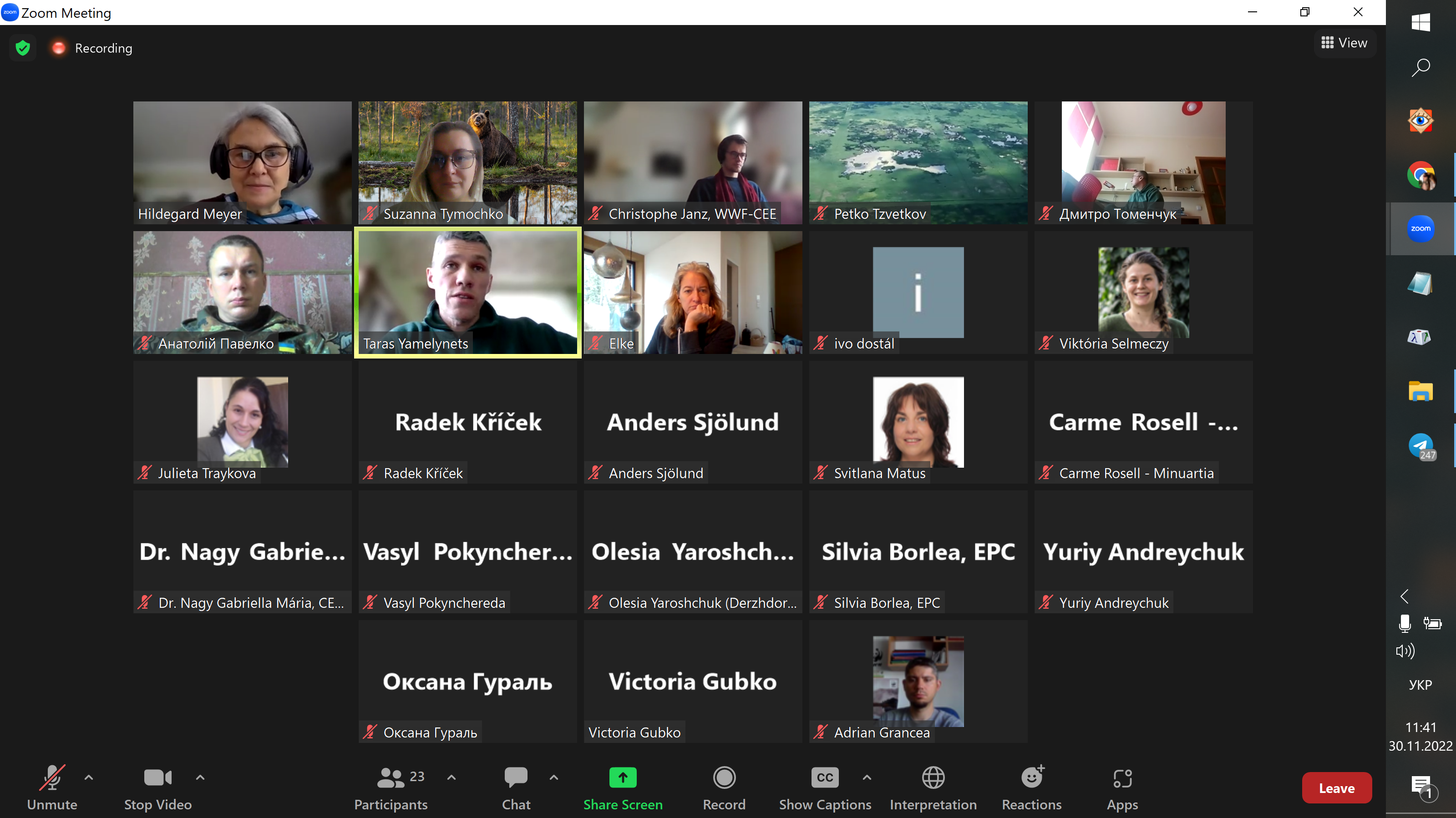SaveGREEN - Ukrainian Expert Team’s Transnational Experience Exchange Workshop
19-12-2022
All together 27 participants gathered at the Transnational Experience Exchange Workshop Ukraine online event within the SaveGREEN project. During the round-table, the participants overviewed the practical experience of project implementation, the results of the work of Ukrainian experts and as WWF-Ukraine's recommendations for post-war restoration of transport infrastructure in Ukraine.
Hildegard Meyer, SaveGREEN project manager opened the workshop and introduced participants to the project in numbers, objectives and main tools: a methodology for standardized monitoring, pilot areas Cross-sectoral Operational Plans and a capacity-building program.
Starting in 2020, WWF-Ukraine experts implemented the SaveGREEN international environmental project in the pilot territory in the Zakarpattia region to:
- develop recommendations for improving, restoring and preserving the functionality of critical ecological corridors in the Carpathian, Alpine and Bulgarian mountains.
- create methods and tools for restoring wildlife migration routes that cross with the objects of transport infrastructure in the Carpathians and mountain massifs of the Danube region.

Participants of the online event and the welcome words from Taras Yamelynets
At the workshop the following reported: Taras Yamelynets, the project coordinator in Ukraine, and the project experts Anatoliy Pavelko (expert on legal support and capacity building), Andriy-Taras Bashta (expert on biodiversity, ecological corridors/connectivity and wildlife monitoring) and Svitlana Matus (expert on national and international politics).
Anatoly Pavelko presented the particularities governing environmental assessments for motorway construction in Ukraine. He said that the Ukrainian project experts established close cooperation with the Ministry of Environmental Protection and Natural Resources of Ukraine and the Ministry of Infrastructure of Ukraine. Together, they worked on the issue of legal regulation of the linear transport infrastructure’s throughput capacity for wild animals.
WWF experts also worked on creating political and administrative tools to support the application of evaluation procedures for future construction projects after the war. Most of the submitted proposals were taken into account. This is the first time when the issue of wildlife passes was taken into account in Ukraine. As soon as the opportunity arises, experts will continue to promote the issue of considering ecological connectivity while designing extensive infrastructure facilities after the war.
Expert zoologist Andriy-Taras Bashta was responsible for field monitoring of biodiversity in the project. He told the participants about the methodology of biodiversity monitoring along the transport infrastructure in the pilot territory in Zakarpattia Oblast, the monitoring results and maps of the monitoring areas. During the monitoring work, the expert used photo traps, monitoring for signs of species presence and deployment of the SaveGREEN QField App.
The Ukrainian project experts prepared recommendations for the relevant ministries on the post-war reconstruction of transport infrastructure in Ukraine. Svitlana Matus presented them at the workshop. These recommendations are a timely and necessary solution because a large part of critical infrastructure in Ukraine has suffered severe damage, and some were completely destroyed.
On April 21, 2022, the National Council for the Recovery of Ukraine from the Consequences of the War was formed. This body is responsible for post-war reconstruction in the country. WWF-Ukraine experts analysed the situation with road/rail transport infrastructure in 2022 and possible environmental risks during the after-war repair/reconstruction. Therefore, recommendations were developed and sent to the National Council’s restoration and development of infrastructure work group - to ensure the design and operation of highways taking into account the impact on the environment. Namely:
Approve the State Standard of Ukraine "Automotive roads". Crossings for wild animals. Design requirements".
Ensure transparency of the EIA (environmental impact assessment) procedure, stakeholders involvement, realistic alternative consideration, and introduction of compensatory measures and measures to minimize the negative impact on biodiversity, such as the construction of wildlife passes.
Create an integrated database on road incidents with wildlife. Track the location and type of wildlife mortality along roads and railways to understand the location of critical areas. Critical areas are dangerous for both wildlife and people. This will help to develop mitigation measures, such as warning road signs and speed limits.
Taras Yamelynets, the project coordinator in Ukraine, emphasizes that WWF-Ukraine experts worked on the green transport infrastructure issue for many years. Previously, in 2017-18, he and other experts implemented the TransGREEN project in Ukraine. The experts of this project worked on the development of modern standards and recommendations for the integrated planning of transport infrastructure objects, as well as on their introduction as instruments of state policy in the countries of the Carpathian region. And already in 2018, the government of Ukraine approved a new transport strategy until 2030 and took into account the recommendations of WWF-Ukraine. In particular, recommendations to prevent the fragmentation of wild animal habitats and ecological corridors due to the arrangement of wildlife passes.
Within the SaveGREEN project, the Ukrainian experts' team achieved:
- Develop and adapt state standards for wildlife passes to the European level. This was done in cooperation with State Enterprise "DerzhDorNDI" and the National Transport University, which are associate partners of SaveGREEN project.
- Develop a standardized methodology for monitoring structural and functional connectivity, as well as a set of tools for monitoring the functionality of ecological corridors along linear transport infrastructure. This tool was implemented within seven pilot territories, partially in the territory of Zakarpattia Oblast.
- Develop recommendations for measures of integration for the settlement of the issue of ecological corridors through the strengthening of intersectoral cooperation.
In project cooperation, relevant stakeholders were involved. The cross-sectoral operational plans for protecting the functionality of ecological corridors were developed, and discussed and are already at the stage of implementation within the project.
The topic, and the achievements were also discussed in details, at December 6-7, Vienna (Austria) at the final Conference of the SaveGREEN project.
Author:
Suzanna Tymochko, Communication Officer, UA Expert Team
